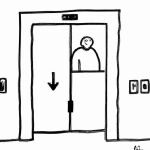The relationship between poor sleep and lactose intolerance
Yes! There is a relationship between sleeping poorly and having trouble digesting lactose, which is the sugar in milk. Find out how to solve this problem here....
Table of Contents
- What is lactose intolerance from milk
- The least expected enemy: milk
- Any digestive problem can complicate your sleep
- Why does this happen? What can we do?
- Unfortunately, lactose-free products are not the answer
- So, how did I improve my sleep?
- How can I tell if I am experiencing this issue?
Follow Patricia Alegsa on Pinterest!
For many years I had trouble staying asleep, but not so much with falling asleep. What would happen is that I would generally fall asleep without too much trouble, but upon waking up, I would feel like the night had been too long.
It also happened that sometimes I would wake up several times during the night, without any apparent reason.
The sleep study led to the diagnosis: I had fragmented sleep. Which basically means that I would wake up during the night, although I wasn't aware of it.
As I said, my sleep problems started at the age of 34. It was getting worse every time. There were days when even my body, my joints hurt.
Never trust food products claiming to be lactose-free: they never truly are.
Initially, from what I have read in studies and a specialized nutrition forum, sleep improvement appears around 4 to 5 weeks after completely eliminating milk. It seems to be the time it takes for the body to recover from the stress caused by lactose.
My sleep improved a lot after eliminating milk. Of course, I also had to address other issues with therapy, such as anxiety and maintaining good sleep hygiene (avoiding screens before bed, keeping the room cool and completely dark, sleeping at the same time every day, etc.).
Sleep problems are usually multifactorial, meaning there is not just one reason that causes sleep issues.
I provide more details on how I managed to improve my sleep in this other article I recommend reading: I Solved my Sleep Problem in 3 Months: I'll tell you how
— Some value in your blood test may be altered: for example, my lymphocytes are higher than usual. Of course, this altered value can also be common in other diseases such as leukemia. So, you should consult with a hematologist if any value in your blood test is altered.
Sleep is fundamental for our lives. If we don't sleep well, not only will we be tired the next day, it is very likely that we will also get sick more often and live a sadder and shorter life.
I suggest you keep reading this other article that may interest you: The more you worry, the less you live
Obviously, during the day I would feel sleepy if I wanted to read a book, I was very tired, had trouble concentrating, and a kind of mental fog that prevented me from thinking clearly.
The strange thing is that there were nights when my sleep was between 7 and 8 hours, which, in a healthy adult, is considered normal. But still, my day was a real ordeal: I would be eager to sleep by 7 in the evening.
Then I stopped feeling like going out to eat with friends or enjoying other nighttime activities, simply because I wanted to sleep or at least rest.
I didn't quickly identify that this was a sleep problem until I had a sleep study done (medically called a polysomnography).
The sleep study led to the diagnosis: I had fragmented sleep. Which basically means that I would wake up during the night, although I wasn't aware of it.
Starting at 28, I began to notice that milk gave me stomach cramps and even excessive gas. The gastroenterologist told me I had lactose intolerance, which is common to appear at that age, but can also manifest at other times in life.
The intolerance got worse over time, I couldn't even taste any snack that had some milk in it, because it made me very sick.
Of course, I started consuming lactose-free products or directly lactose-free. I also bought lactase enzyme capsules, which are taken a little before consuming milk and help your intestines process the milk better.
The lactase enzyme is what the body is lacking and, for this reason, those of us who are lactose intolerant cannot consume milk: we cannot break down the lactose or milk sugar.
For a while, my life was fairly normal, I could consume milk as long as I took the lactase enzyme... although I started experiencing sleep problems at 34.
The intolerance got worse over time, I couldn't even taste any snack that had some milk in it, because it made me very sick.
Of course, I started consuming lactose-free products or directly lactose-free. I also bought lactase enzyme capsules, which are taken a little before consuming milk and help your intestines process the milk better.
The lactase enzyme is what the body is lacking and, for this reason, those of us who are lactose intolerant cannot consume milk: we cannot break down the lactose or milk sugar.
For a while, my life was fairly normal, I could consume milk as long as I took the lactase enzyme... although I started experiencing sleep problems at 34.
The least expected enemy: milk
As I said, my sleep problems started at the age of 34. It was getting worse every time. There were days when even my body, my joints hurt.
Of course!, after a hard gym routine, the body needs to rest and recover... as my body was not repairing properly, mysterious pains appeared.
All the doctors I went to pointed out that my health was impeccable. And, regarding my sleep problem, it was anxiety, which was a matter to be resolved with psychological therapy or sleeping medications.
But I found a very particular pattern regarding sleep: there were nights when I slept much better than others. The conditions were the same. What could be happening?
I started researching on the internet and, to my surprise, lactose intolerant individuals often have trouble sleeping.
For example, this study "Nutritional disorders and digestive diseases" published in the National Library of Medicine (NLM) is very clear about it.
You can read more scientific studies showing this issue even in infants, for example: Sleep peculiarities in lactose intolerant infants(also in English).
There are countless scientific articles that show a link between poor sleep and digestive problems, not only lactose intolerance, but also gastric reflux, inflammatory bowel diseases, liver and pancreas diseases, alterations in intestinal microbiota, and many others.
Here is another article from a respected source that supports this theory: Why food intolerances might be ruining your sleep
All the doctors I went to pointed out that my health was impeccable. And, regarding my sleep problem, it was anxiety, which was a matter to be resolved with psychological therapy or sleeping medications.
But I found a very particular pattern regarding sleep: there were nights when I slept much better than others. The conditions were the same. What could be happening?
I started researching on the internet and, to my surprise, lactose intolerant individuals often have trouble sleeping.
For example, this study "Nutritional disorders and digestive diseases" published in the National Library of Medicine (NLM) is very clear about it.
You can read more scientific studies showing this issue even in infants, for example: Sleep peculiarities in lactose intolerant infants(also in English).
Any digestive problem can complicate your sleep
There are countless scientific articles that show a link between poor sleep and digestive problems, not only lactose intolerance, but also gastric reflux, inflammatory bowel diseases, liver and pancreas diseases, alterations in intestinal microbiota, and many others.
Here is another article from a respected source that supports this theory: Why food intolerances might be ruining your sleep
In fact, if you enter nutrition forums, you will find people sharing their problems, for example, this one appears on a Reddit forum:
"Some time ago, I followed a special diet, which involved drinking half a gallon of milk a day to help gain weight. Since then, every time I drink milk or dairy products, I am sure to have disrupted sleep, waking up at 3 or 4 in the morning and unable to fall back asleep."
Why does this happen? What can we do?
Well, no one has given an answer to the topic yet. It could be that some proteins, peptides, and other molecules in dairy are treated by the body as foreign molecules. Thus, for some people, this could trigger an immune response; which, of course, will be terrible for sleep.
The stress that lactose (or any other food that causes discomfort) produces in the body will generate cortisol, which is the hormone responsible for responding to that stress.
The highest level of cortisol in the blood occurs in the first hour after waking up and decreases throughout the day, reaching its lowest level while we sleep.
The stress that lactose (or any other food that causes discomfort) produces in the body will generate cortisol, which is the hormone responsible for responding to that stress.
The highest level of cortisol in the blood occurs in the first hour after waking up and decreases throughout the day, reaching its lowest level while we sleep.
Now, what happens if the body produces cortisol while we sleep? It wakes us up or interrupts our sleep, and sometimes we don't even notice it.
Another possible mechanism, although less studied, is that dairy products could also influence the intestinal microbiota, which could be harmful for many things, including sleep.
Lactose-free products (often labeled as 100% lactose-free or 0% lactose) may seem like the solution at first... but if your lactose intolerance is severe, I must tell you that almost all lactose-free products, even if they claim to be 100% lactose-free, may still contain small traces that could disrupt your sleep.
What I suggest you do, and what I did, is eliminate milk from your life. While milk is a very complete food (I loved it, especially chocolate milk), unfortunately I had to remove it from my diet: a good night's sleep is much more important.
Read the labels of every product you put in your mouth carefully; there are products that contain very little milk or milk derivatives, but could still be disrupting your sleep.
I also recommend that you purchase the dietary supplement lactase enzyme, which I mentioned earlier. You should take it (at least 3 pills of 9000) when you suspect that a product may contain some milk and you must consume it.
Nevertheless, the best general rule is to simply not consume anything derived from milk, even in small amounts: butter, cheese, yogurt, cream.
Read the labels of every product you put in your mouth carefully; there are products that contain very little milk or milk derivatives, but could still be disrupting your sleep.
I also recommend that you purchase the dietary supplement lactase enzyme, which I mentioned earlier. You should take it (at least 3 pills of 9000) when you suspect that a product may contain some milk and you must consume it.
Nevertheless, the best general rule is to simply not consume anything derived from milk, even in small amounts: butter, cheese, yogurt, cream.
Never trust food products claiming to be lactose-free: they never truly are.
Initially, from what I have read in studies and a specialized nutrition forum, sleep improvement appears around 4 to 5 weeks after completely eliminating milk. It seems to be the time it takes for the body to recover from the stress caused by lactose.
So, how did I improve my sleep?
My sleep improved a lot after eliminating milk. Of course, I also had to address other issues with therapy, such as anxiety and maintaining good sleep hygiene (avoiding screens before bed, keeping the room cool and completely dark, sleeping at the same time every day, etc.).
Sleep problems are usually multifactorial, meaning there is not just one reason that causes sleep issues.
I provide more details on how I managed to improve my sleep in this other article I recommend reading: I Solved my Sleep Problem in 3 Months: I'll tell you how
Well, there are lactose intolerances that are very subtle, that will depend on each person. When you drink milk, you may hardly notice discomfort, some sounds in your stomach, but not much more.
There are several medical studies that you can ask your doctor for that can guide you and know if you could be suffering from lactose intolerance or other food intolerances:
There are several medical studies that you can ask your doctor for that can guide you and know if you could be suffering from lactose intolerance or other food intolerances:
— Lactose intolerance test: Ask your gastroenterologist for the lactose intolerance test, and while you're at it, you could also ask to test if you are celiac; it is very likely that celiac disease also generates sleep problems.
— Cortisol blood test: This requires an analysis of your blood, early in the morning. If the value is altered, it means that your body is stressed, and the cause could be a food intolerance.
— Cortisol blood test: This requires an analysis of your blood, early in the morning. If the value is altered, it means that your body is stressed, and the cause could be a food intolerance.
— Abdominal ultrasound: In my case, over these years, I had at least three abdominal ultrasounds. In all of them, the gastroenterologist noticed intense gas stored in my intestines in the images. This means that some food I consume produces too many gases in my body: and that can be seen in the ultrasound images! It is a very strong indicator that lactose is not breaking down as it should.
— Some value in your blood test may be altered: for example, my lymphocytes are higher than usual. Of course, this altered value can also be common in other diseases such as leukemia. So, you should consult with a hematologist if any value in your blood test is altered.
Sleep is fundamental for our lives. If we don't sleep well, not only will we be tired the next day, it is very likely that we will also get sick more often and live a sadder and shorter life.
I suggest you keep reading this other article that may interest you: The more you worry, the less you live
Consult your doctor about all of this that I have mentioned in this article! I improved my sleep a lot after discovering that foods could be causing me sleep problems.
I sincerely hope this article helps you sleep better.
I sincerely hope this article helps you sleep better.
Subscribe to the free weekly horoscope
Aquarius Aries Cancer Capricorn Gemini Leo Libra Pisces Sagittarius Scorpio Taurus Virgo
-
 What does it mean to dream of riding a bicycle?
What does it mean to dream of riding a bicycle?
Discover the meaning behind your bike ride dreams. Find answers about your past and future in this comprehensive and detailed article. -
 Why is it so difficult to lose abdominal fat?
Why is it so difficult to lose abdominal fat?
I give you some tips that will help you lose abdominal fat and show a better figure. -
 Discover the 8 Toxic Communication Habits That Sabotage Your Relationships!
Discover the 8 Toxic Communication Habits That Sabotage Your Relationships!
8 toxic communication habits you might be committing unknowingly: discover how they affect your relationships and improve with expert advice. -
 Advice for finding love according to your zodiac sign
Advice for finding love according to your zodiac sign
Discover how to find the perfect love according to your Zodiac sign. Short tips for you in your search for love. -
 What does it mean to dream of bowls?
What does it mean to dream of bowls?
Discover the meaning behind your dreams with bowls. Do they represent abundance or the need to feed your soul? Find answers in this article.
I am Patricia Alegsa
I have been writing horoscope and self-help articles professionally for over 20 years.
Subscribe to the free weekly horoscope
Receive weekly in your email the horoscope and our new articles on love, family, work, dreams and more news. We do NOT send spam.
Astral and numerological analysis
-
 Discover your future, secret personality traits and how to improve in love, business and life in general
Discover your future, secret personality traits and how to improve in love, business and life in general
-
 Online Dream Interpreter: with artificial intelligence
Do you want to know what a dream you had means? Discover the power of understanding your dreams with our advanced online dream interpreter using artificial intelligence that responds to you in seconds.
Online Dream Interpreter: with artificial intelligence
Do you want to know what a dream you had means? Discover the power of understanding your dreams with our advanced online dream interpreter using artificial intelligence that responds to you in seconds.
-
 What does it mean to dream of aging?
What does it mean to dream of aging?
Discover the meaning behind your dreams about aging. Do you feel worried about the passage of time? Find out what your subconscious wants to tell you. -
 What does it mean to dream of elevators?
What does it mean to dream of elevators?
Discover the meaning of your dreams with elevators. Do you go up or down? Does it stop? We tell you everything you need to know in our article. Enter now! -
 What does it mean to dream of symbols?
What does it mean to dream of symbols?
Discover the meaning behind your dreams with symbols. This article will help you interpret your dreams and understand how they can affect your daily life. -
 What does it mean to dream of gambling?
What does it mean to dream of gambling?
Discover the hidden meaning behind your gambling dreams in this fascinating article. Learn how to interpret them and what messages are behind them. -
 What does it mean to dream of windmills?
What does it mean to dream of windmills?
Discover the fascinating world of dreams and their interpretation in What does it mean to dream of windmills, a revealing article that will guide you through the mysteries of your mind. -
 10 Foolproof Tips to Improve Your Mood, Boost Your Energy, and Feel Amazing
10 Foolproof Tips to Improve Your Mood, Boost Your Energy, and Feel Amazing
Discover how to lift your mood and fill yourself with positive energy, even on the grayest days. Find the key to improving your well-being and enjoying a fuller, happier life—don’t wait any longer to change your mood! -
 Tattoos can cause cancer: a type of lymphoma
Tattoos can cause cancer: a type of lymphoma
The discovery that tattoos may increase the risk of lymphoma underscores the need for more research in this area and raises important questions about the long-term safety of tattoos. -
 Moving your body daily rejuvenates your immune system and reduces the risk of cancer
Moving your body daily rejuvenates your immune system and reduces the risk of cancer
Moving your body daily rejuvenates your immune system and reduces the risk of cancer: up to 34% of deaths from inflammation could be prevented with physical activity. -
 There are people who avoid looking into the eyes when speaking. What does this mean?
There are people who avoid looking into the eyes when speaking. What does this mean?
Discover the meaning of not looking someone in the eye while speaking and the reasons behind this behavior. Eye contact is key in communication. Get informed here! -
 The incredible story of the journalist who killed women to narrate his own crimes
The incredible story of the journalist who killed women to narrate his own crimes
Discover the chilling story of the 'monster of Kicevo': a journalist who became a murderer to narrate his own crimes. Shocking! -
 Secrets of the Zodiac signs when they are in love
Secrets of the Zodiac signs when they are in love
Discover how to spot the hidden signs of a crush and find out if that special someone likes you. Learn how to interpret the signs of love. -
 Brad Pitt reveals what his worst movie was
Brad Pitt reveals what his worst movie was
Brad Pitt confessed about his worst decision in a movie: 'It was my peak of disorientation.' Despite his successes, he revealed the reason for his regret. -
 Best Nighttime Habits: Dinner and Sleep to Improve Your Health
Best Nighttime Habits: Dinner and Sleep to Improve Your Health
Discover nighttime habits that improve your sleep, eliminate toxins, and prepare your body for restorative rest. Transform your nights!